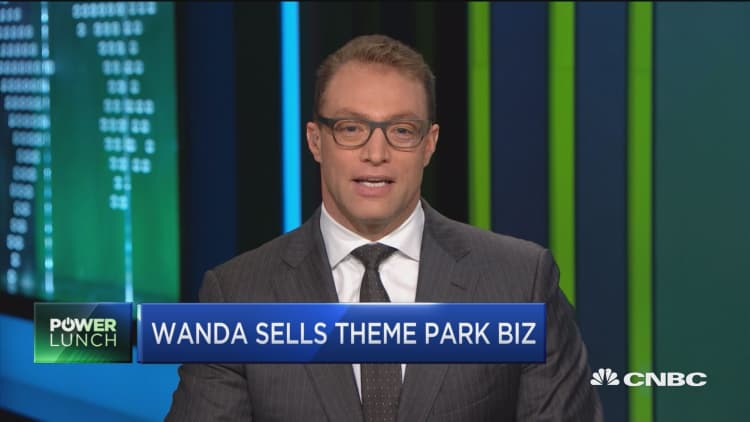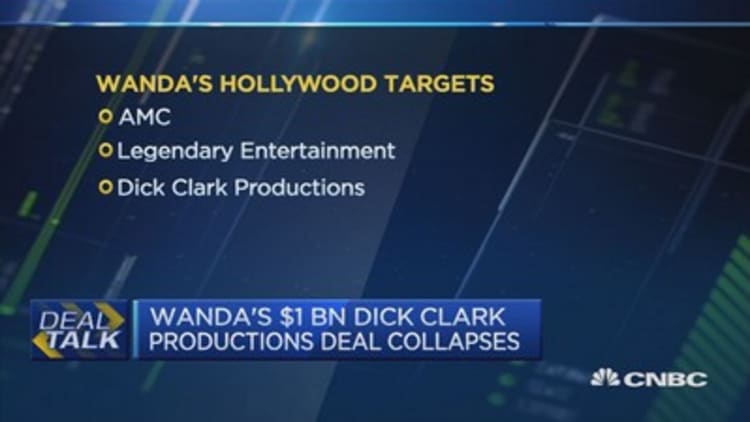Wanda Group's surprising disposal of US$9.3 billion worth of assets to Sunac China Holdings has raised plenty of unanswered questions among China's business circles after official explanations from the two companies failed to fully convince a sceptical market.
At the centre of the mystery is the enormous costto Wanda of its divestment, with chairman Wang Jianlin's only official explanation being to "reduce debt" and adopt an "asset-light" business model. Previously he has not given any indication of the intended asset sale.
More from the South China Morning Post:
Ambitious Sunac is buying its way to dominance
Wanda takes on Shanghai Disney with series of new theme parks across China
China's banking regulator orders loan checks on Wanda, Fosun, HNA, others
Just a week ago, Wang was guest of honour at a banquet hosted by Yunnan province's Party Secretary when the billionaire revealed a 32 billion yuan (US$4.7 billion)plan to create a city-size project combining health care services, holiday resort and business facilities. And at the end of June, Wang announced the opening of the nearly 40 billion yuan Wanda City development in northeast Harbin.
Now, these two projects are among the 13 that Wang offloaded for 29.6 billion yuan – despite Wanda's total investment of 430 billion yuan – with Sunac paying another 33.6 billion yuan for 76 Wanda hotels.
The Sunac deal is even more surprising given that Wang had pinned hopes for his company's diversification from property development on the Wanda Cities projects.

Just a year ago, Wang described his chain of theme parks as a "pack of wolves" that would encircle and overpower Walt Disney's US$5.5 billion Shanghai Disneyland. With Wanda retaining only a 9 per cent stake in the theme parks and Shanghai Disneyland turning profit one year after opening, analysts don't see how Wang can deliver on his promise.
Adding to outsiders' concerns is the apparent urgency of the deal – with the two companies agreeing to sign detailed agreements before the end of July. Sunac China said in a filing to the Hong Kong bourse on Tuesday that the final payment of 29.57 billion yuan to complete the deal will be made within two days after it receives a loan worth 29.6 billion yuan, funded by Wanda.
Analysts said the arrangement will help Wanda partly offload the asset-related investment risks.
By lending funds to Sunac, Wanda is turning part of its equity interest into loan interest, said Chen Shujin, chief financial analyst with Hong Kong-based Huatai Financial Holdings.
"The risks brought by asset management will be shifted to Sunac through this arrangement. While Wanda will rest on loan interest income, which is less risky," she said.
Three relatively convincing reasons for the sale of assets to Sunac have emerged based on a study of the facts and available data.
First is the recent probe by the banking regulator and the subsequent funding pressure that put on the company. Wanda Group was among the five big overseas deal makers that were investigated by the banking regulator last month for their overseas borrowings. Although no wrongdoing has been alleged or found, the probe rattled China's rumour-sensitive creditors. Hedge funds sold Wanda bonds after being tipped off about the probe, triggering a slump in bond prices.
Two managers within the corporate banking departments of mainland lenders told the South China Morning Post that they were sceptical of Wanda City's business model even before the regulator's probe. One asset manager said he wouldn't buy Wanda bonds.

When looking at the official balance sheet of Wanda, the company's debt ratio is not elevated, especially compared with other debt-fuelled mainland developers. Dalian Wanda Commercial Properties, the property unit that generates 55 per cent of the group's revenue, had 544.6 billion yuan of liability by the end of the first quarter. But given its larger assets of 771.3 billion yuan, the debt-to-asset ratio of 70.6 per cent is on par with the industry average and the 86.7 per cent for Sunac China.
Ratings agency S&P last December downgraded the property unit's rating to one notch above "junk", with a negative outlook, citing increased financial leverage due to larger-than-expected capital expenditure. In January Moody's did the same.
A second reason relates to Wanda's planned IPO on the A-share market. At the end of September 2016, Wanda paid shareholders US$4.4 billion to delist the company from the Hong Kong stock exchange, with the aim of relisting it on the mainland at a higher valuation. Leaked agreements with creditors showed that Wanda agreed to buy back the shares at a premium price – equal to an 8 and 10 per cent annual return for domestic and overseas investors – if the relisting plan failed two years later.
Wanda has not yet received approval to be relisted on mainland exchanges.
Analysts said if Wanda continues to apply for the relisting as a "property company" it would be difficult to get approval due to China's property market clampdown. Such failure would risk a stampede among creditors, fearing Wanda would lose its financing channel.
"Shedding these so far unprofitable assets would not only reduce the company's debt ratio, highlighting the asset-light model, but also raise its chance of being listed as a non-property company," said Yan Yuejin, an analyst with E- house China R& D Institute.
A third reason revolves around speculation that Wanda may buy Sunac's ownership in Leshi Internet Information &Technology Corp, an asset that could have synergy with Wanda's entertainment pivot.
An asset manager with a state-owned bad asset management company, who declined to be identified, said Wanda may have reached an agreement with Sunac to take over the troubled Leshi, which Sunac bought for US$2.2 billion in January.
The source said Wanda Film had long been seeking an opportunity to buy streaming video sites.
Additional reporting by Xie Yu

